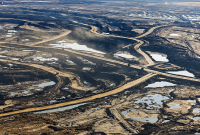The first official estimate of how much oil may lie beneath the central Northwest Territories says there could be nearly 200 billion barrels of the resource in two separate fields.
The National Energy Board and the Northwest Territories Geological Survey warn that not all of that oil will be recoverable.
But if even a few per cent of it is economically viable, it confirms previous suggestions the Canol and Bluefish shales hold up to seven billion barrels of recoverable oil and could be comparable to North Dakota's booming Bakken field.
"These are large numbers," said N.W.T. Energy Minister Dave Ramsay.
"This should increase the level of investor confidence and revitalize interest in the Northwest Territories. This really does put wind in our sails."
About 146 billion barrels are estimated for Canol and 46 billion for Bluefish.
The board didn't give an estimate of how much of that oil might be recoverable because well test results haven't been released. It's also still uncertain whether those shales are capable of production at all.
The potential fields lie in the central Mackenzie Plain, west of Great Bear Lake.
Several companies have been active in the area in recent years, with 14 exploration licenses being granted and $628 million in work commitments since 2010. Imperial (TSX:IMO), Shell, Husky (TSX:HSE) and ConocoPhillips have all been involved in the region.
However, recent low oil prices have brought that activity almost to a standstill. Husky and ConocoPhillips recently announced they would step back from their Canol projects.
That standstill is affecting local people looking for business opportunities, Ramsay said recently in Houston where he was trying to attract investment.
"The aboriginal groups in the region had bought a hotel. These hotels once were full. They weren't full this winter."
Both the Canol and Bluefish fields would be developed using fracking technology, which some in the territory oppose.
Keith Stewart of Greenpeace said recent science suggests that fracking can pollute groundwater kilometres away from the drill site.
"It would be a huge mistake to invest billions in expensive and risky fracking projects when we have so many better ways to create jobs and meet our energy needs without contaminating drinking water or accelerating global warming," he said.
Ramsay maintains the oil can be developed safely. He points out the N.W.T. is now developing improved regulations for fracking intended to safeguard the environment.
Ramsay said Friday's results bolster the territory's argument that infrastructure such as an all-weather road up the Mackenzie Valley is needed.
"One of the knocks against us has been lack of infrastructure. We really have to be putting those investments in place in our territory."
— Follow Bob Weber on Twitter at @row1960
Bob Weber, The Canadian Press



Comments